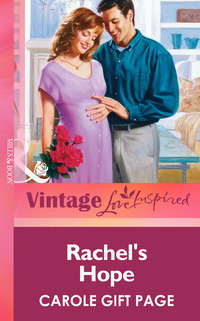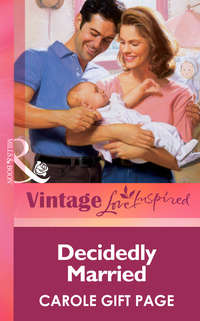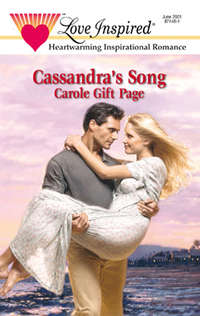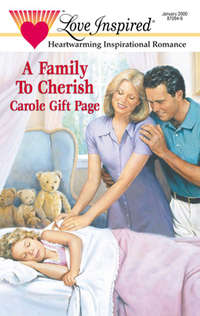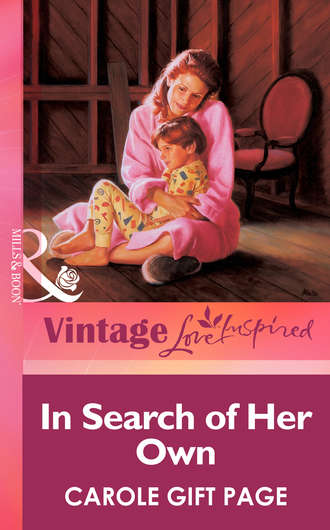
Полная версия
In Search Of Her Own

Table of Contents
Cover Page
Excerpt
About the Author
Title Page
Epigraph
Prologue
Chapter One
Chapter Two
Chapter Three
Chapter Four
Chapter Five
Chapter Six
Chapter Seven
Chapter Eight
Chapter Nine
Chapter Ten
Chapter Eleven
Chapter Twelve
Chapter Thirteen
Chapter Fourteen
Chapter Fifteen
Chapter Sixteen
Chapter Seventeen
Chapter Eighteen
Chapter Nineteen
Chapter Twenty
Chapter Twenty-One
Chapter Twenty-Two
Chapter Twenty-Three
Chapter Twenty-Four
Chapter Twenty-Five
Chapter Twenty-Six
Chapter Twenty-Seven
Chapter Twenty-Eight
Chapter Twenty-Nine
Chapter Thirty
Epilogue
Dear Reader
Copyright
“How do you do it, Mr. Anders? Where do you begin looking for a missing child?”
Victoria’s pulse quickened.
Philip laughed gently. “Really, Miss Carlin, you don’t expect me to give away trade secrets, do you?”
Embarrassment colored her cheeks. “It’s just so fascinating. If someone were looking for…someone,” she persisted, “you would be willing to go out and search for him—or her?
” He studied her. “Are you looking for someone, Miss Carlin? A missing child?”
She averted her gaze, her thoughts drifting off to a familiar darkness. Yes, I see a nameless, faceless child; my sweet little boy lost; heart of my heart, my very life. I never stop looking, and yet I wouldn’t know him if I passed him on the street.
Victoria’s hands were trembling. “I never said that, now, did I, Mr. Anders?”
His gaze remained unflinching. “Sometimes a person’s silences say more than their words.”
CAROLE GIFT PAGE
writes from the heart about contemporary issues facing adults. Considered one of America’s bestloved Christian fiction writers, Carole was born and raised in Jackson, Mississippi. She is the recipient of two Pacesetter Awards and the C.S. Lewis Honor Book Award. Over eight hundred of Carole’s stories, articles and poems have been published in more than one hundred Christian periodicals.
A frequent speaker at conferences, schools, churches and women’s ministries around the country, Carole finds fulfillment in being able to share her testimony about the faithfulness of God in her life and the abundance He offers those who come to Him. Carole and her husband, Bill, have three children and live in Moreno Valley, CA.
In Search of Her Own
Carole Gift Page

www.millsandboon.co.uk
Come now and let us reason together, saith the Lord: though your sins be as scarlet, they shall be as white as snow: though they be red like crimson, they shall be as wool.
Isaiah 1:18
Prologue
March, Easter Sunday
I went to the cemetery this cold, slate gray morning—had to, felt compelled, driven, as if the choice had been made for me. I stood with my back rigid, my hands doubled into fists, the wind whipping my hair, a torrent of tears dammed behind my eyes.
I had to be with Mother.
Hard to believe; the terrible reality still bombards me, like barbs in the flesh, sudden, unexpected, stealing my breath, leaving me reeling.
My mother is dead
Nearly a month now since she died.
I stood in the light powdery snow for what seemed forever—yes, mud-rippled snow and frozen ground on this Resurrection Sunday; no sign of spring, no tree limbs budding with the promise of life. My feet and hands grew numb; my throat ached, raw with the cold
I realize now I should have worn the heavy nubby coat Mother gave me when I began teaching at the university—a long, tailored, practical coat, a deep teal green, a color Mother said brought out the red in my auburn hair and accented the aqua-green of my eyes. I remember she got the coat on sale at Harris’s, or was it RobinsonsMay? Mother never paid full price for anything in her life. It was a wonderful buy, she said; it would last me for years, she said.
I accepted it gratefully, profusely grateful, as I accepted all of Mother’s gifts She shouldn’t have, I told her; it was more than I deserved—I, the daughter who never measured up.
But not even Mother’s marvelous coat could have warmed me today I knew it as I approached the grave site. The coldness in my bones didn’t come from winter’s lingering chill. It was the coldness of death, like a rock in my chest, hard, frigid, unmoving. Today at her grave I noticed the earth was still scarred, not smooth and untouched like the land around it. It was the only sign, the remnant clue, that a funeral had occurred, a burial taken place
Where my mother lies, the frozen earth still speaks of the deed, bears witness to it In time it, too, will take on the bland, anonymous, impeccable look of a rich man’s lawn. I accept that fact, as I accept the fact that my mother is gone, her soul is in heaven.
But can I ever accept her going?
This morning I knelt down and placed a perfect white lily on her grave. White on white, life and death blending into a milky blur—the smooth creamy flesh of the lily against the gritty, icy blue snow. There is no marker yet. The headstone will take several weeks to make. It will match my father’s stone nearby—that proper, solemn slab of granite with his name precisely carved in large letters—James Edward Carlin, Beloved Husband And Father. Yes, that austere stone is a perfect memorial to a man as imperious in death as he was in life.
When I stood, my nylons were drenched; my knees revolted against the coldness I wanted to do something or speak or walk somewhere. I wanted to feel some satisfaction in standing there, staring down at my parents’ graves But I felt as numb as my fingers I wanted to turn and walk away or run to my car and drive somewhere where music was playing and people were singing-some lovely cathedral perhaps where spires rose heavenward and a man of God might declare triumphantly, Death, where is thy sting; grave, where is thy victory?
I wanted to be with somebody today. Not just somebody. I wanted to be with my mother. But there was no one around, except a stranger standing a short distance away by a large marble stone, his head bowed, his back to me-a tall, broad-shouldered man in a leather trench coat, a deep smoky gray color, his collar upturned against the cold. He wasn’t wearing a hat and his thick brown hair looked wet from the snow.
“I’m here with you, Mother,” I said aloud, but my voice came out too small, swallowed by the wind. I realized I, too, was being swallowed, but not by the elements—by something more immense and just as impalpable. For this time,—for however long it lasts—I am as immobilized in life as my mother is in death. Perhaps worst of all, in spite of my faith, my life no longer matters to me. I know I should release my pain to God, but how? How can I surrender to the One I’m afraid now to trust?
It was irrational, I know, but I kept talking to Mother as if she could hear me. “I’ve received so many cards and phone calls Even people I hardly know have offered their condolences,” I said, raising my voice against the whistling wind.
The stranger turned and glanced my way, as if he thought I might be addressing him. I caught a glimpse of dark mahogany eyes and chiseled, aristocratic features.
I looked down, abashed, then lifted my gaze as the stranger came my way. Our eyes met and held for a long moment as he passed by, his expression warm with sympathy and compassion. He had the most compelling eyes I had ever seen He seemed to be telling me, We are kindred spirits inhabiting the same emotional place. You’re not alone. I understand your pain.
Something leapt inside me, an instinctive response, a yearning to hold on to this moment of connection with another grieving soul. I wanted to say something, offer a smile But as quickly as our fragile alliance formed, it slipped away. The stranger walked on through the fine blanket of snow, and I felt even more alone than before.
I turned back to my mother’s grave and said, too brightly, “Like I was saying, Mother, you wouldn’t believe all the people who’ve phoned—dozens of your former students, and mine People we haven’t heard from in years, some even since Father’s death six years ago “
Six years
It’s hard to believe Mother and I have been alone, had no one but each other all that time Even our colleagues at the university have maintained a polite distance all these years, comfortably insulated in their lofty bastion of academia. Convivial intellectuals, they are, who enjoy a good time as much as anyone, I suppose, but two lone women never quite fit their scheme of things.
Or perhaps we never tried—or cared to try—to fit their scheme We kept to ourselves, pleased to dwell in peace, living quiet, orderly lives. And, of course, for me, a predictable routine was an immense relief after those earlier days, after that black hole of time seven years ago.
As my eyes returned inevitably to my father’s headstone, memories swirled around me like a dark funnel cloud drawing me into its vortex. In its violent maelstrom I could hear my father’s voice thundering, “How could you do this to us, Victoria? How could you let it happen? You’ve thrown away your future for some gypsy actor. You’ve shamed us all with his misbegotten child. Is this the kind of woman we raised you to be? Mark my words, daughter, you’ll be the death of me yet.”
I was the death of you. Father. No one said an accusing word, but everyone knew the heart attack was my fault, my doing. If only I hadn’t disappointed you; if only I hadn’t broken your heart’
But it does no good to dwell on the past. Haven’t I learned that by now? You’re gone, Father. And now Mother is gone, too. I’m alone for the first time in my life, tied to no one, no bonds by blood, by birth, by affection. My last living relative has died
No, that’s not so.
There is another—blood of my blood, bone of my bone
My child.
Somewhere in this vast world lives a little lost boy whose face I’ve never seen, whose voice I’ve never heard, except that day in the delivery room for a sliver of time before he was whisked away from me forever
Where are you now, my son? Who do you call Mother? Do you have my eyes, my nose, my hair? My penchant for privacy? My love of books? When I lost you, my arms ached for months for someone to hold I felt as if someone had plundered my heart and left me for dead.
But I denied my pain because I felt I had no right to grieve. For my parents’ sake I bore my shame in silence and denied my son’s existence.
But he lives.
He’s somewhere, someone’s child
I’ve voiced the question over and over through a thousand sleepless nights, but now that I’m truly alone the question takes on an urgency I can no longer deny. I have to know’
Where is my son?
Chapter One
It was the first of May before Victoria returned to the cemetery—a gray, chill, cloud-heavy day with only faint streamers of sunlight to remind her it was spring. Her mother’s headstone was in place now, surrounded by a lush green carpet of tender new grass The imposing granite monument matched her father’s marker, stately without being ostentatious. She stooped down and placed a potted plant in the grass—butter yellow chrysanthemums as bright as sunbursts, her mother’s favorite; the house and garden had been filled with them when Victoria was growing up
“I’m sorry I haven’t come more often, Mother,” she said, wincing with shame. Somehow, even from the grave, her mother could make her feel guilty! “I don’t know why I haven’t come. I guess coming here makes your death more real and stirs up the pain,” she said, feeling the need to explain, to justify herself. “I’ll do better, I promise.”
God help me, I sound like a schoolgirl who’s been caught cheating or skipping class! God, you’ve forgiven me; why can’t I forgive myself?
Blinking back bitter tears, Victoria turned her gaze away from her parents’ markers. Her eyes settled on the immense gravestone a few yards away where the tall stranger had stood, head bowed, during her last visit. The lowering rays of the sun breaking through the cloudy sky highlighted the inscription Pauline Anders, Beloved Wife.
Victoria could barely make out the dates beneath the name. She squinted, silently calculating. Dear God in heaven, how tragic! The woman died at thirty. So young! Only a few years older than I am, Victoria noted, stunned, recalling the pain, masked but still apparent, in the furrows of the stranger’s brow. She turned and fished in her purse for a tissue I shouldn’t have come. I can’t handle this. My emotions are still too fragile.
Blotting the moisture from her eyes, she squared her shoulders and began walking back to her car. She was almost to the road when she noticed someone approaching—the mysterious man in the trench coat who belonged to Pauline Anders. Only now he was wearing a brown leather aviator jacket with a fleecy wool collar. And he was carrying flowers—red roses in a deep ceramic vase, a dozen at least. He offered Victoria an oblique smile as their paths crossed, and she obligingly returned it. In the fractional moment their eyes met she was reminded that theirs was a peculiar alliance—deep losses borne separately and in a sense shared wordlessly, beyond time and circumstance.
Too soon she looked away, breaking eye contact with the stranger, feeling suddenly self-conscious, almost flustered. The man’s amber eyes were so vivid, so penetrating; it was as if he could read her very soul. She walked on, shivering, pulling her long, hunter green cardigan tighter around her, her cold fingers burrowing into the marled, slubby yarns. It was nearly dusk, and the chill air was already invading her bones. The overcast sky promised rain. Lots of it. Weren’t April showers supposed to bring May flowers, not just more rain? Right now she wanted nothing more than to be at home in her little condominium, snuggling on the couch in her comfy flannel robe, sipping chamomile tea and watching the evening news on TV.
Unexpectedly, Victoria was aware of a sound behind her—heavy footsteps padding through the thick grass. She glanced around and felt a ripple of surprise. The stranger was striding her way, a shadowy form against the darkening skyline.
Victoria increased her pace, pretending not to notice him. Her automobile wasn’t far—the gray compact parked just outside the cemetery’s huge iron gate.
But the man’s gait also increased. She sensed him just behind her, his breathing nearly as audible as her own. She walked faster now, her pulse racing, her ankle nearly turning as her stacked heels sank into the grassy, uneven ground. You hear such awful stories all the time, she thought frantically, breaking into a run. Women alone attacked by strangers, psychotics, madmen; women foolhardy enough to venture alone into dangerous desolate places like this one…
A deep masculine voice behind her shouted, “Stop! Wait!”
Was he kidding? She wouldn’t give in without a fight. She bolted through the open iron gate, running to her car She glanced over her shoulder and saw him running after her Finally she reached the car. She leaned panting against the door. Now if only she could find her keys’ She looked down at her empty hands. Her purse-it was gone!
“Miss, I think this is what you’re looking for.” The stranger hovered over her, surely more than six feet to her five feet six inches. She caught the clean fragrance of his spicy after-shave and the minty warmth of his breath. He held out her handbag, managing an amused, crinkly smile “You dropped this back there in the grass “
She looked up at him, dazed, her pulse suddenly racing with something quite different from terror, and mumbled, “I did?”
“I’m sorry,” he continued, those mesmerizing eyes holding her captive. She couldn’t help noticing that he had an uncommonly handsome face, and at the moment he seemed almost to be enjoying her predicament. “I mean it,” he went on seriously “I really didn’t intend to frighten you “
She took the purse and with trembling fingers found her keys “That’s all right,” she murmured, fumbling with the lock. She opened the door and glanced back briefly. “I feel so foolish It’s just that this place can be a bit unnerving “
“Don’t I know it,” he said with a faint smile.
Feeling the need to say something more, she gazed up at the gray, drizzling sky and said, “This really isn’t the sort of day to be out, is it? It looks like it’s going to pour any minute now.”
His voice was warm, almost a confidential tone “I know Some weather for May, huh? I was hoping to beat the rain, but no such luck.”
She opened her palm to the sky “You’re right. It’s already starting I guess I’d better go.”
He nodded and flipped up the large fleecy collar of his leather jacket. “Drive safely,” he said, his candid brown eyes still boring into hers
As the first large drops fell, she gave him a fluttery wave and climbed into her car He returned the wave with a good-natured smile, then turned and walked quickly to his automobile. Victoria fastened her seat belt and turned the key in the ignition, but nothing happened. She tried again, and again, but there was only a dull click-click-click.
She heard a tap on her window and glanced over to see the stranger. “Release the hood and I’ll check it for you,” he told her.
A minute later he returned to her. “The water level in your battery’s down. The terminals are corroded. You’ll need a new battery.”
“Oh, great.” She sighed. “I’ll have to call the auto club.”
He leaned into the open window, his face close to her own. “I wish I had some jumper cables,” he said with an earnestness that touched her. “I’ll be glad to drive you to a gas station where you can make your call.”
She stiffened. “No, thank you. I—I really couldn’t impose.”
“Please, I insist. It goes against my gentlemanly instincts to leave a lady stranded in this downpour. I’d really like to help.” When she still looked doubtful, he offered a reassuring smile “I know what they say about riding in cars with strangers, but I assure you I’m harmless.”
Victoria weighed her options, and finally offered a noncommittal, “Thank you. I’d appreciate a ride.” She picked up her purse and followed the man to a sleek, metallic-red foreign sports car.
As he drove toward the business district of the city, he glanced over at her and said, “I suppose this would be a good time to introduce ourselves. I’m Phillip Anders.”
She smiled “I’m Victoria Carlin.”
“I’m glad to meet you, Victoria. Actually, I remember seeing you at the cemetery before.”
“Yes. I remember seeing you, too. It was Easter Sunday “
He flashed an ironic smile. “There has to be a better meeting place than Rest Haven.”
Victoria laughed faintly. She wasn’t quite sure how to take this unpredictable man, Phillip Anders. One moment he seemed brooding and introspective, the next he was making droll jokes and offering the most disarming smile.
They drove to a nearby filling station where Victoria made her call “It’ll be at least an hour or more before the tow truck can come,” she told Phillip when she returned to his car.
“All right,” he said. “I’m in no hurry. Before I take you back to your car, let’s stop by the little coffee shop next door.”
“Oh, no,” she protested. “You don’t have to wait with me.”
“I never leave a lady in distress.” Laugh lines appeared around his eyes. “Like I said, I want to make sure you aren’t stranded in this miserable weather.”
In the Dew Drop Inn, a waitress showed them to a corner booth just off the kitchen. Several yellowed western prints decorated the mauve walls and an antique coatrack stood nearby. Phillip hung up their coats, then they sat down and ordered coffee. “Hot and black,” he told the teenage waitress with backcombed, tangerine hair
Victoria shivered involuntarily “I didn’t realize how cold I was.”
“It shouldn’t be this cold in May. We’ve had enough winter.”
She nodded. “That’s how I feel. It seems as if winter has lasted for years,”
“It has,” he murmured thoughtfully. “And there’s no end in sight.”
“I have a feeling you’re not talking about the weather now.”
“No.” He paused. “Tell me, Miss Carlin—or is it Mrs.?”
She felt her face flush slightly “Miss.”
“Then that’s not your husband’s grave?”
“No. My mother’s.”
“I noticed two headstones.”
“My father died six years ago.”
“I’m sorry. I know how hard it is. I lost both my parents when I was young.”
“And now your wife,” she said softly
He nodded, a tendon tightening along his jawhne. “It’s been nearly a year. You’d think it would get easier.”
“She was so young. Do you mind my asking? Was it an accident?”
“Cancer. She never gave up. Bravest woman I ever knew.”
They were both silent for several moments, sipping their coffee. Finally, in a lighter tone, he asked, “Just what is it you do, Miss Carlin—other than frequent cemeteries, that is?”
“I’m an instructor at the university. Contemporary American literature. I’m finishing my third year of teaching.”
“Oh. one of those studious types—your nose always in a book?”
Victoria unconsciously lifted her hand to the back of her neck. “I suppose you could say that. I’m working on the thesis for my doctorate.”
“I’m impressed,” said Phillip. “My remark about studious types wasn’t meant as an insult. I admire intelligent women. It’s just that you don’t look like any of the teachers I had in school—you know, the old-maid schoolmarms with their hair in a bun and spectacles halfway down their noses.”
Victoria forced a laugh. “In just which century did you attend school, Mr. Anders?”
He accepted her mild rebuff. “All right, I’m exaggerating. But you look like you’d be more at home on the tennis courts or horseback riding in the country.”
Victoria sipped her coffee, then said, “I’ve never played tennis or been on a horse. I’ve spent most of my life in libraries and classrooms “
“Even when you were a child?”
“Yes. My parents were both professors at the university and, for as long as I can remember, they stressed the importance of education. They naturally expected me to become a teacher, too.”


